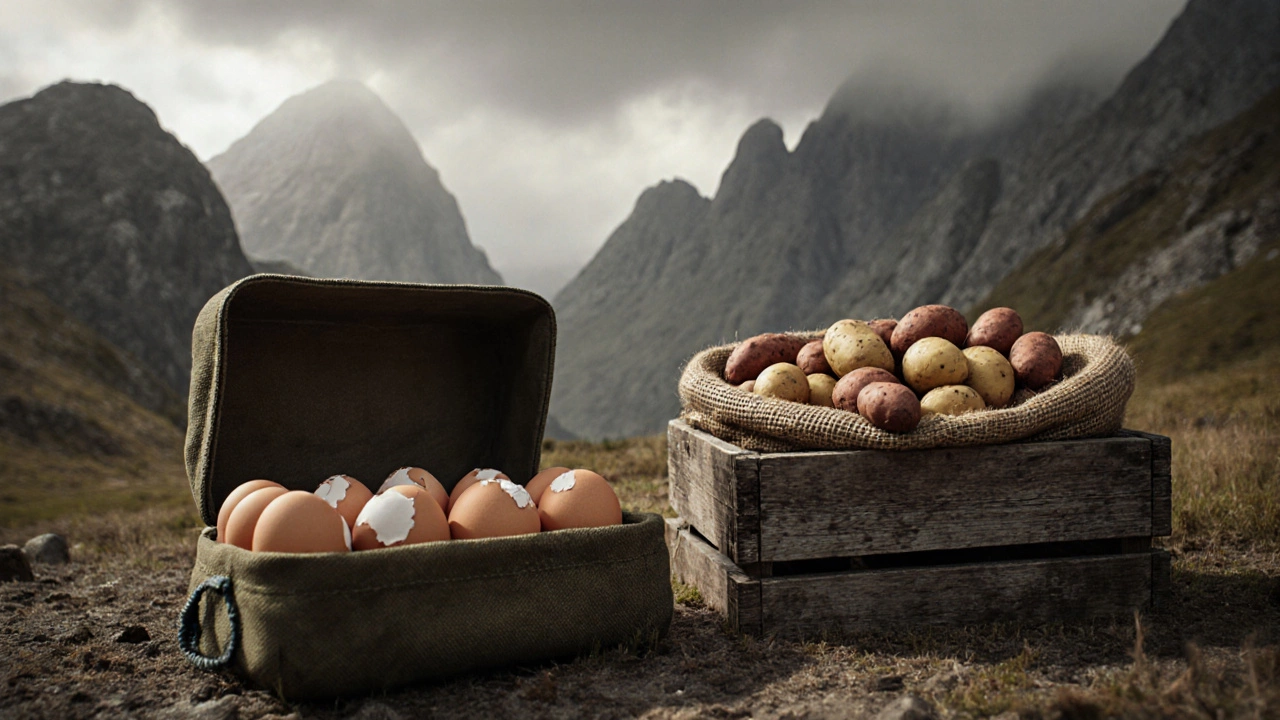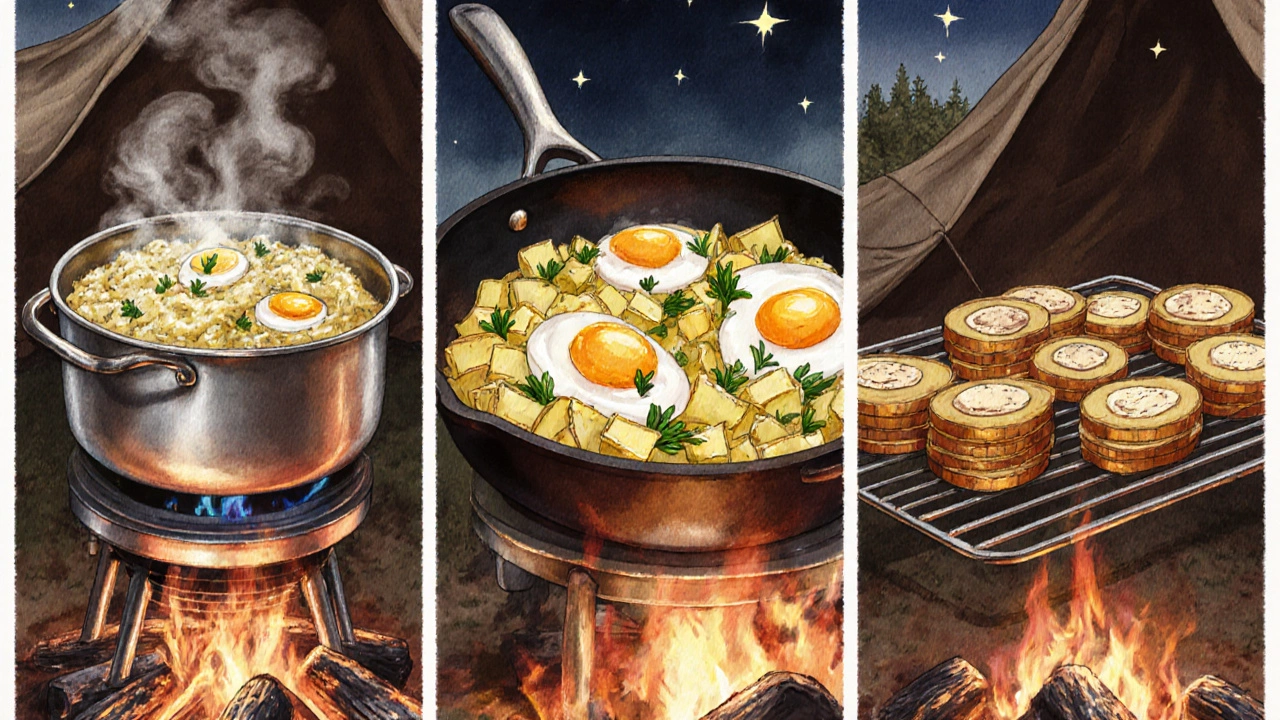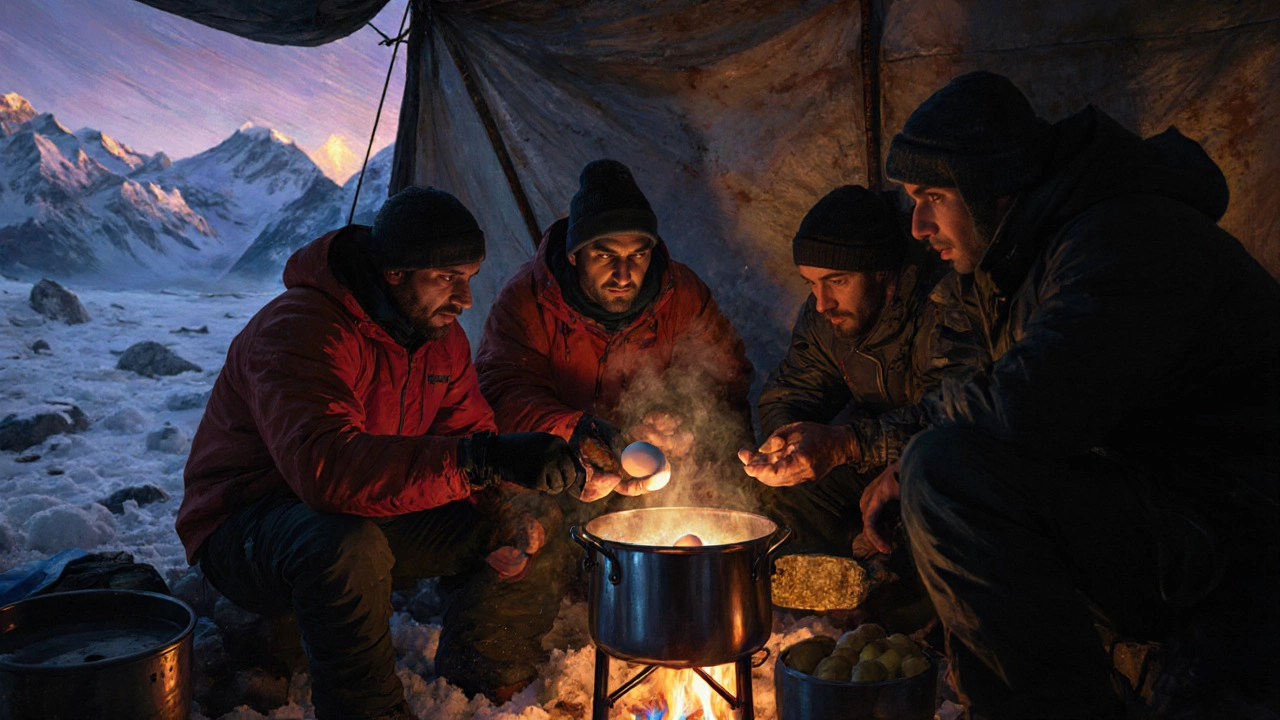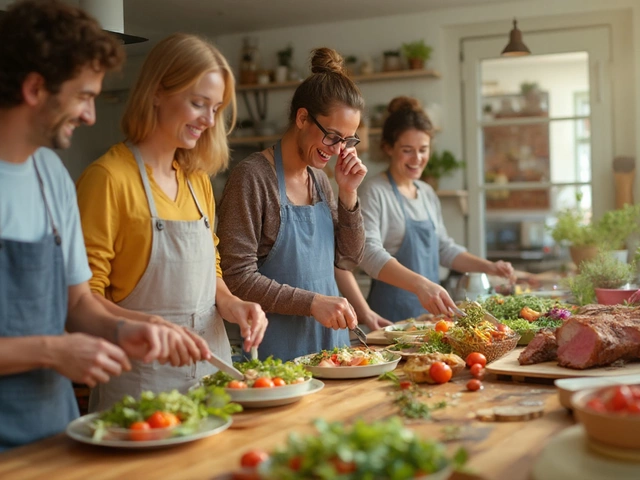
Survival Food Calculator
Micronutrient Coverage
Potential Deficiencies
When a disaster strikes or you find yourself on a long trek, the first question that pops up is: survive on two foods. It sounds impossible, but science says a well‑chosen pair can keep you alive and relatively healthy for weeks.
Quick Takeaways
- Eggs and potatoes together provide protein, carbs, fats, and most essential micronutrients.
- Both store well-eggs in a cool place, potatoes in a dark, ventilated area.
- Supplement with water, vitamin C sources, and occasional herbs to avoid deficiencies.
- Cooking methods (boiling, scrambling, baking) keep meals varied and tasty.
- A simple checklist can help you pack, store, and rotate your supplies.
Understanding a Minimal Survival Diet
In a survival diet is the set of foods you rely on when other options are unavailable, designed to meet caloric and nutritional needs over an extended period. The goal isn’t gourmet cuisine; it’s preventing muscle loss, maintaining immunity, and keeping mental clarity.
Key nutrients to watch are protein (muscle repair), carbohydrate (energy), fat (long‑term fuel and cell health), plus a suite of vitamins and minerals. When you strip the menu down to two items, each must hit multiple boxes.
The Two Foods That Cover All Bases
After sifting through dozens of candidates-rice, beans, lentils, canned fish, even dried meat-we landed on a classic combo: egg is a protein‑rich animal product containing all essential amino acids, healthy fats, and a range of vitamins like B12, D, and A and potato is a starchy tuber offering complex carbohydrates, potassium, vitamin C, and dietary fiber when eaten with the skin. Together they tick the major nutrient boxes.
Why Eggs?
- High‑quality protein (about 6 g per large egg).
- Rich in fat (5 g) that supplies essential omega‑3s when you get pasture‑raised eggs.
- Contain vitamin B12, crucial for nerve function-something most plant‑only foods lack.
- Can be cooked in dozens of ways without needing fancy tools.
Why Potatoes?
- Offer 17 g of carbohydrate per 100 g, providing steady energy.
- Supply up to 30 % of the daily potassium needs in a single serving, helping fluid balance.
- When the skin stays on, you get about 2 g of fiber per 100 g, aiding digestion.
- Easy to store for months if kept cool, dark, and well‑ventilated.
Nutrient Profile Breakdown
| Attribute | Egg (whole) | Potato (with skin) |
|---|---|---|
| Calories | 155 kcal | 77 kcal |
| Protein | 13 g | 2 g |
| Carbohydrate | 1.1 g | 17 g |
| Fat | 11 g | 0.1 g |
| Vitamin B12 | 0.9 µg (15 % DV) | 0 µg |
| Vitamin C | 0 mg | 19 mg (31 % DV) |
| Potassium | 126 mg | 425 mg (12 % DV) |
| Shelf Life (room temp) | 2-4 weeks (refrigerated) | 2-3 months (cool, dark) |

How to Prepare Them for Variety
Even with just two ingredients, you can keep meals interesting. Here are three quick methods:
- Boiled & Mashed: Boil potatoes until tender, mash with a pinch of salt, and stir in chopped hard‑boiled eggs for a rustic hash.
- Scrambled & Fried: Scramble eggs with diced boiled potatoes, add herbs like parsley for flavor.
- Baked Duo: Slice potatoes, layer with cracked eggs, bake at 180 °C for 20 minutes - you get a one‑dish casserole.
All you need is a pot, a pan, and a heat source. No fancy gadgets, just heat and a little imagination.
Potential Pitfalls and How to Fix Nutrient Gaps
Relying on eggs and potatoes covers most macros, but a few micronutrients need attention:
- Vitamin C: Potatoes give some, but to hit the recommended 90 mg for men (75 mg for women) you might add a squeeze of lemon or a handful of dried berries when available.
- Calcium: Eggs provide a modest amount; consider a small serving of powdered milk or calcium‑fortified water.
- Omega‑3 fatty acids: If your eggs aren’t from pasture‑raised hens, supplement with a few walnuts or chia seeds that store well.
These additions are optional but help avoid fatigue, bone loss, or skin issues over longer periods.
Extending the Diet with Simple Add‑Ons
When you have a chance to scavenge or trade, the following low‑maintenance items complement the core duo nicely:
- Salt - crucial for electrolyte balance.
- Honey or sugar - quick energy spikes during intense activity.
- Dried herbs (oregano, thyme) - boost flavor and add antioxidants.
- Portable water filter - ensures you stay hydrated with clean water.

Real‑World Survival Stories
During the 2015 Everest base‑camp evacuation, climbers survived for 12 days on a stash of hard‑boiled eggs and dehydrated potatoes. The mix kept their caloric intake near 2,000 kcal daily, preventing severe weight loss.
In 2022, a remote New Zealand farmer’s family weathered a three‑week power outage using only a crate of eggs and a sack of potatoes. They rotated the eggs, boiled the potatoes, and kept morale up by making “egg‑potato pancakes” each morning.
Quick Checklist Before You Pack
- 70‑100 large eggs (store in a cooler or insulated bag).
- 10-15 kg of potatoes (choose russet or Yukon Gold for better storage).
- Salt, a small bottle of lemon juice, and a handful of dried herbs.
- Portable water container and a basic filter.
- Simple cooking gear: pot, pan, and a reliable heat source (camp stove or fire‑proof pot).
Rotate supplies every month: use the oldest eggs first, replace any that develop off‑odors. This way the stash stays fresh for the long haul.
Frequently Asked Questions
Can I survive on eggs and potatoes alone for months?
Yes, if you pair them with adequate water and occasional micronutrient boosters (like lemon juice for vitamin C). The combo meets daily protein, carb, and fat needs, and supplies enough calories to maintain weight. However, long‑term health would benefit from added calcium and omega‑3 sources.
How long can eggs stay edible without refrigeration?
In a cool, shaded environment (under 15 °C) fresh eggs can last about 2‑3 weeks. For longer storage, keep them in a makeshift cooler with sand or a water‑filled container to keep temperature down.
Do I need to cook potatoes before eating them?
Raw potatoes contain solanine, a natural toxin. Cooking eliminates the risk, so always boil, bake, or fry them before consumption.
What’s the best way to keep potatoes from sprouting?
Store them in a dark, well‑ventilated place at 7‑10 °C. A cardboard box in a basement or pantry works well. Keep them away from onions, which emit gases that speed sprouting.
Can I substitute sweet potatoes for regular potatoes?
Yes, sweet potatoes boost beta‑carotene (vitamin A) but have slightly higher sugar content. Pair them with eggs the same way you would regular potatoes.





